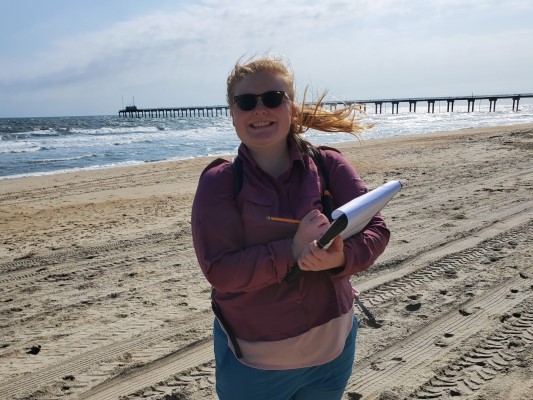Emily Riffe's article published on award-winning science website for young adults
May 30, 2024

A part of any researcher’s path is to write and publish papers. Usually, the papers are only seen by their peers or others who are interested in the type of research explained, and are written in scientific jargon that makes it difficult for the general public to understand.
Emily Riffe, a Ph.D. candidate with the Center for Integrative Life Sciences Education, was used to these parameters, but a session she attended at a conference offered a different way to communicate science that left her intrigued.
The session moderator introduced the group to Frontiers for Young Minds, a part of Frontiers, that makes cutting-edge science available to primary school students. The papers submitted go through a traditional review process, and the platform is open source so students and teachers do not have to worry about a paywall to access articles.
Before she decided to submit a paper to Frontiers, Riffe introduced her idea to Julie Zinnert, Ph.D. associate professor with VCU Department of Biology. Zinnert is her faculty advisor, and oversees the Coastal Plant Ecology Lab Riffe is part of. With the support of Zinnert and the other students in the lab, Riffe began the process of writing a paper to the targeted audience.
Her current research focuses on the Virginia barrier islands, after spending her master’s work studying invasive species in the North Carolina mountains. Zinnert was on Riffe’s thesis committee during her time at Appalachian State University. The interaction between the two led to Riffe’s decision to pursue her Ph.D. at VCU. Once in the program, she began researching the effects of climate change and sea level rise on barrier islands. “It is the most challenging work I have done, because the variables are constantly changing,” she said.
Writing for the 8 - 12-year-old age group proved to be a challenge. Her goal with this paper – and her focus throughout her writing career – was to keep the copy as explanatory as possible without using too much jargon. “That always wasn’t a natural fit,” she explains. Once completed and submitted, a panel of three in this age group reviewed the paper. Riffe said they were not hesitant to provide honest feedback. “They ask many questions, and the illustrations have to perfectly match the narrative.”
The paper was accepted. “What Are Barrier Islands and How Are They Affected by Climate Change?” was published May 1, 2024.
She continues her work at the Virginia Coast Reserve, a Long-Term Ecological Research site, which is funded by the National Science Foundation. She also continues to find collaborators who share the same vision of writing papers that can be easily consumed by everyone. Riffe remarks, “It is a little extra work, but it is important work.”